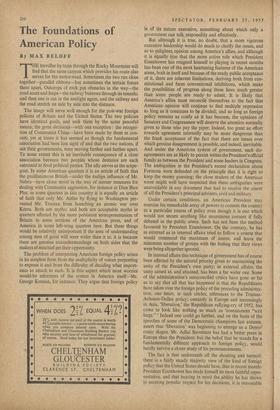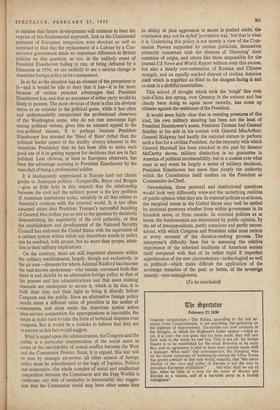By MAX BELOFF T HE traveller by train through the Rocky
Mountains will find that the same canyon which provides his route also serves for the motor-road. Sometimes the two run close together—parallel ribbons—but sometimes the terrain forces them apart. Outcrops of rock put obstacles in the way—the road soars and leaps—the railway burrows through its tunnels; and then one is out in the sunlight again, and the railway and the road stretch on side by side into the distance.
The image will serve well enough for the post-war foreign policies of Britain and the United States. The two policies have identical goals, and seek them by the same peaceful means; the great decisions—with one exception : the recogni- tion of Communist China—have been made by them in con- cert; yet at times it has seemed as though the fundamental association' had been lost sight of and that the two nations, if not their governments, were moving farther and farther apart. To some extent this is an inevitable consequence of a close association between two peoples whose destinies are each entrusted to tival political parties. The ally serves as the scape- goat. In some American quarters it is an article of faith that the pusillanimous British—under the malign influence of Mr. Nehru—have alone stood in the way of sterner measures for dealing with Communist aggression, for instance at Dien'Bien , Phu; in some quarters in this country it is equally an article of faith that only Mr. Attlee by flying to Washington pre- vented Mr. Truman from launching an atomic war over Korea. Both are myths; and both are acceptable myths in quarters affected by the more persistent misrepresentation of Britain in some sections of the American press, and of America in some left-wing quarters here. But these things would be relatively unimportant if the area of understanding among men of good will were wider than it is; it is because there are genuine misunderstandings on both sides that the makers of mischief get their opportunity. But although it is true, no doubt, that a more vigorous executive leadership would do much to clarify the issues, and so to enlighten opinion among America's allies, and although it is equally true that the more active role which President Eisenhower has resigned himself to playing in recent months has been one of the most heartening features of the American scene, both in itself and because of the ready public acceptance of it, there are inherent limitations, deriving both from con- stitutional and from conventional inhibitions, which make the possibilities of progress along these lines much greater than some people are ready to admit. It is likely that America's allies must reconcile themselves to the fact that American opinion will continue to find multiple expression so long as it continues to be divided; and so long as foreign policy remains as costly as it has become, the opinions of Senators and Congressmen will deserve the attention normally given to those who pay the piper. Indeed, too great an effort towards agreement internally may be more dangerous than the frank acceptance of the fact that there are issues over which genuine disagreement is possible, and indeed, inevitable. And under the American system of government, such dis- agreements ate as likely to persist within the President's official family as between the President and some leaders in Congress. The ambiguities in the President's recent declaration about Formosa were defended on the principle that it is right to keep the enemy guessing; the close student of the American scene might well have suspected that these ambiguities were unavoidable in any document that had to receive the assent of all the President's principal advisers, civil and military.
Under certain conditions, an American President may exercise his remarkable array of powers to commit the country to a particular course of policy even though it is one which would not secure anything like unanimous consent if fully debated in the public arena. Such has not been the method favoured by President Eisenhower. On the contrary. he has in external as in internal affairs tried to follow a course that would command the maximum of assent, and leave the minimum number of groups with the feeling that their views were being altogether ignored.
In internal affairs this technique of government has of course been affected by the natural priority given to maintaining the unity of the President's own party; in external affairs, the unity aimed at, and attained, has been a far wider one. Some of the administration's unreconciled critics have gone so far as to say that all that has happened is that the Republicans have taken over the foreign policy of the preceding administra- tion; one hears, in such circles, references to the Truman- Acheson-Dulles policy; certainly in Europe and increasingly in Asia, 'liberation,' the Republican rallying-cry of 1952, has come to look like nothing so much as 'containment "writ large."' Indeed one could go farther, and on the basis of the speeches of some of the Democratic champions last autumn, assert that 'liberation' was beginning to emerge as a Demo- cratic slogan. Mr. Adlai Stevenson has had a better press, in Europe than the President; but the belief that he stands for a fundamentally different approach to foreign policy, would hardly survive a closer study of his pronouncements. to surmise that future developments will continue to bear the imprint of this fundamental approach. Just as the Continental partisans of European integration were shocked as well as surprised to find that the replacement of a Labour by a Con- servative government made no important difference to British policies on this question, so too, in the unlikely event of President Eisenhower failing to run, or being defeated by a Democrat in 1956, we are unlikely to see a serious change in American foreign policy as its consequence.
In so far as the situation has an element of the precarious in it—and it would be idle to deny that it has—it is far more because of certain personal advantages that President Eisenhower has, and that no successor of either party would be likely to possess. The most obvious of these is that his obvious status as an outsider in the political game, while it has often and understandably exasperated the professional observers of the Washington scene, who do not rate innocence high among political virtues, gives him an unusual appeal to the non-political masses. It is perhaps because President Eisenhower has stressed the 'Head of State' rather than the political leader aspect of the duality always inherent in the American Presidency that he has been able to make such good use of it in getting support for decisions that are in fact political. Less obvious, at least to European observers, has been the advantage accruing to President Eisenhower by the mere fact of being a professional soldier.
It is inadequately appreciated in Europe (and our classic guides to American politics—Tocqueville, Bryce and Brogan —give us little help in this respect) that the relationship between the civil and the military power is the key problem of American institutions today, certainly in all that relates to America's contacts with the external world. It is too often assumed either that President Truman's successful handling of General MacArthur put an end to the question by decisively demonstrating the superiority of the civil authority, or that the establishment and development of the National Security Council has endowed the United States with the equivalent of a cabinet system within which any discordant trends in policy can be resolved, with proper, but no more than proper, atten- tion to their military implications.
On the contrary, there are still important elements within the military establishment, largely, though not exclusively, in the air arm—elements for whom Admiral Radford has become the best-known spokesman—who remain convinced both that there is and should be an alternative foreign policy to that of the present and late administrations and that since existing channels are inadequate to secure it, which is its due, it is both their duty and their right to bring it directly before Congress and the public. Since an alternative foreign policy would mean a different order of priorities in tho matter of armaments, and since under the American system active inter-service competition for appropriations is inevitable, the issues at stake tend to take the form of technical disputes over weapons. But it would be a mistake to believe that they are Is narrow as this fact would suggest.
What is urged upon the administration, the Congress and the public is a particular interpretation of the world scene in terms of the inevitability of armed conflict between the West and the Communist Powers. Since, it is argued, this war will be won by strategic air-power, all other aspects of foreign policy must be subordinated to the logic of logistics. Politics Ind economics—the whole complex' of social and intellectual :ompetition between the Communist and the Free Worlds is irrelevant; any hint of neutrality is treasonable: any sugges- tion that the Communist world may have other assets than its ability to plan aggression in secret is pushed aside; the conclusion may not be styled 'preventive war,' but that is what it is. Underlying this policy is not merely a view of the Com- munist Powers supported by certain publicists, themselves primarily concerned with the chances of 'liberating' their countries of origin, and others like those responsible for the journal US News and World Report without even this excuse, but also a steady over-estimation of Russian and Chinese strength, and an equally marked distrust of civilian America itself which is regarded as blind to the dangers facing it and as sunk in a slothful materialism.
This school of thought which took the 'tough' line over Endo-China last spring, over Quemoy in the autumn and has clearly been doing so again more recently, has come up hitherto against the resistance of the President.
It would seem fairly clear that in resisting pressures of this kind, his own military standing has been not the least of President Eisenhower's assets. President Truman had General Bradley at his side in his contest with General MacArthur; General Ridgway had hardly the national stature to perform such a feat for a civilian President. As the impunity with which General Marshall has been attacked in the past by Senator McCarthy shows, military distinction is no guarantee in America of political invulnerability; but in a contest over what must in any event be largely a series of military decisions, President Eisenhower has more than simply the authority which the Constitution itself confers on the President as Commander-in-Chief.
Nevertheless, these personal and institutional questions would look very differently were• not the underlying realities of public opinion what they are. In external policies as at home, the marginal issues in the United States may well be settled by sectional pressures whether from within government in its broadest sense, or from outside. In external policies as at home, the fundamentals are determined by public opinion, by the set of presuppositions, partly conscious and partly uncon- scious, with which Congress and President alike must reckon at every moment of the decision-making process. The interpreter's difficulty here lies in assessing the relative importance of the inherited traditions of American society itself compared with that of its rather rapid if imperfect apprehension of the new circumstances—technological as well as political—which make difficult the application of the sovereign remedies of the past; or better, of tho sovereign remedy—non-entanglement.
(To be concluded)











































 Previous page
Previous page